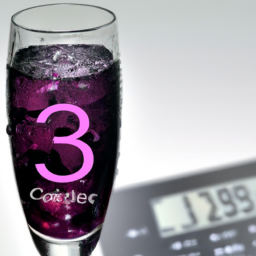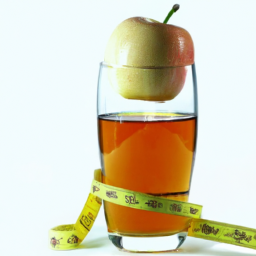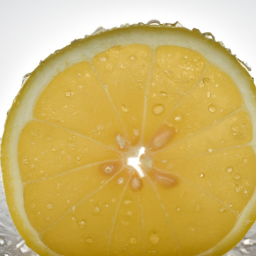Watermelon has always been a favorite of mine, especially in the summer heat. But as I watch my calorie intake, I often wonder about the calories in watermelon juice.
After all, while watermelon is largely made up of water and nutrients, it also contains natural sugars that can add up if consumed in excess.
So, how many calories are in watermelon juice? The answer depends on several factors, including the type of watermelon, the amount of juice extracted, and any additional ingredients added to the juice.
In this article, we’ll explore the nutritional value of watermelon, the calorie count in watermelon juice, and the health benefits of incorporating this refreshing drink into your diet. We’ll also provide tips for making low calorie watermelon juice, alternatives to watermelon juice, and discuss the importance of portion control and moderation when consuming this tasty beverage.
Key Takeaways
- The calorie count in watermelon juice depends on several factors, including the type of watermelon, the amount of juice extracted, and any additional ingredients added to the juice.
- One cup of diced watermelon contains only 46 calories and is rich in vitamin C, vitamin A, and potassium.
- Watermelon juice is a low-calorie alternative that can help with hydration.
- Incorporating watermelon juice into a healthy diet can be achieved by choosing nutritious foods, balancing macronutrients, and staying active.
Nutritional Value of Watermelon
You’ll be pleasantly surprised by the nutritional punch that watermelon packs, with plenty of vitamins and minerals to keep your body fueled and feeling great. One cup of diced watermelon contains only 46 calories and is rich in vitamin C, vitamin A, and potassium. It also contains lycopene, an antioxidant that may reduce the risk of heart disease and certain types of cancers.
Watermelon juice is a refreshing and hydrating drink that can be made using various juicing techniques and flavor combinations. While the calorie count in watermelon juice may vary depending on the recipe, it generally contains fewer calories than other fruit juices.
In the next section, we’ll take a closer look at how many calories are in a serving of watermelon juice.
Calorie Count in Watermelon Juice
There’s a noticeable difference in the nutritional value of fresh watermelon juice compared to other fruit juices. While most fruit juices contain a high amount of calories and sugar, watermelon juice is a low-calorie alternative that can help with hydration.
Here are some of the benefits of hydration and how watermelon plays a role:
- Helps regulate body temperature and prevent overheating
- Aids in digestion and nutrient absorption
Role of watermelon in hydration:
- Watermelon is 92% water, making it a hydrating fruit
- Contains electrolytes like potassium, which help maintain fluid balance in the body
Drinking watermelon juice is a great way to stay hydrated while also getting some added nutrients. In the next section, I’ll discuss some of the health benefits of watermelon juice.
Health Benefits of Watermelon Juice
If you’re looking for a refreshing and nutritious drink, sipping on some ice-cold watermelon juice on a hot summer day could be just what you need. Not only is it delicious, but it also provides numerous health benefits.
One of the most notable benefits of watermelon juice is its hydration benefits. Watermelon is about 92% water, making it an excellent source of hydration during hot summer days or after a workout. Additionally, watermelon is rich in electrolytes like potassium and magnesium, which help to maintain the body’s fluid balance.
Another benefit of watermelon juice is its benefits for skin health. Watermelon is packed with antioxidants like vitamin C and lycopene, which help to protect the skin from damage caused by environmental stressors, such as pollution and UV rays. These antioxidants also help to promote collagen production, which can improve skin elasticity and reduce the appearance of wrinkles. Drinking watermelon juice regularly can also help to improve overall skin hydration, which is essential for maintaining healthy and glowing skin.
With all these benefits, it’s no wonder that watermelon juice has become a popular drink among health enthusiasts. But if you’re looking to make it even healthier, there are some tips for making low calorie watermelon juice that you can follow.
Tips for Making Low Calorie Watermelon Juice
Want a healthier option for your summer drink? Check out these tips for making a low-calorie version of your favorite watermelon juice.
First, try experimenting with different flavor variations. You can add a squeeze of lime or lemon for a tangy twist, or a few sprigs of mint for a refreshing flavor. You can also blend in other fruits, such as strawberries or raspberries, to give your juice a fruity punch.
Second, consider using juicing techniques that help preserve the fiber content of the watermelon. One way to do this is to use a blender instead of a juicer, which will allow you to keep the pulp in the juice.
Another option is to strain the juice through a fine mesh sieve, which will remove any large chunks of pulp but still leave some fiber intact. By including fiber in your juice, you’ll be able to slow down the absorption of sugar and reduce the overall calorie count.
Looking for alternatives to watermelon juice? Try infusing your water with fresh fruit or herbs, or making a low-calorie smoothie with frozen fruit and Greek yogurt. There are plenty of options to choose from that can help you stay hydrated and healthy throughout the summer.
Alternatives to Watermelon Juice
You think you’re being healthy by drinking fruit juice, but did you know there are other options that could be better for you? Watermelon juice may be low in calories, but it is still high in sugar.
If you’re looking for a healthier alternative, consider trying unsweetened tea, infused water, or vegetable juice. Not only do these options contain fewer calories and less sugar, but they also offer additional health benefits.
Reducing your sugar intake can have a significant impact on your overall health, including reducing your risk of developing chronic conditions such as obesity, type 2 diabetes, and heart disease.
So, next time you’re reaching for a glass of watermelon juice, consider trying one of these alternatives instead.
Now, let’s discuss the importance of portion control and moderation when it comes to your diet.
Portion Control and Moderation
Remember, it’s important to keep in mind the significance of portion control and moderation in maintaining a healthy diet. When it comes to food and drinks, consuming too much of anything can lead to negative consequences. This is why it’s crucial to practice mindful eating and to be aware of how much we are consuming.
One way to control portions is to use a food scale or measuring cups to portion out your food and drinks. Another helpful tip is to use smaller plates and glasses to make it appear as though you are consuming more than you actually are. Additionally, taking the time to eat slowly and savoring each bite can also help you feel more satisfied and prevent overeating. By practicing portion control and mindful eating, we can enjoy our favorite foods and drinks while still maintaining a healthy diet.
Incorporating watermelon juice into a healthy diet can be a great way to stay hydrated and get essential nutrients. But before we dive into the benefits of watermelon juice, let’s first discuss how to consume it in moderation and with proper portion control.
Incorporating Watermelon Juice into a Healthy Diet
I believe that incorporating watermelon juice into my healthy diet can be achieved by choosing nutritious foods, balancing macronutrients, and staying active.
To begin, I’ll focus on selecting whole, unprocessed foods that are packed with nutrients. Next, I’ll aim to balance my intake of carbohydrates, proteins, and fats to meet my body’s needs.
Lastly, I’ll make an effort to stay active throughout the day, whether it’s through regular exercise or simply moving more during daily activities. By following these key points, I can ensure that my diet is both nutritious and satisfying.
Choosing Nutritious Foods
When choosing nutritious foods, it’s important to note that a single cup of fresh watermelon juice contains only 46 calories. This makes it an ideal choice for healthy hydration, as it not only quenches thirst but also provides essential vitamins and minerals.
Watermelon juice is also rich in nutrient density, meaning it contains a high amount of nutrients compared to its calorie content. This makes it a great addition to any healthy diet, especially for those looking to manage their weight.
However, it’s important to remember that watermelon juice should not be the sole focus of a healthy diet. Balancing macronutrients, such as carbohydrates, proteins, and fats, is important for overall health and wellbeing.
Incorporating a variety of nutrient-dense foods, including fruits, vegetables, lean proteins, and healthy fats, can help ensure that your body is receiving all the essential nutrients it needs to function properly.
Balancing Macronutrients
As I mentioned earlier, choosing nutrient-dense foods is crucial for maintaining a healthy diet. However, it’s not just about the types of foods we eat, but also how we balance our macronutrients.
Macronutrients include carbohydrates, proteins, and fats, which are essential for fueling our bodies and providing us with energy. When it comes to balancing macronutrients, it’s important to consider the timing of our nutrient intake.
For example, consuming carbohydrates before a workout can provide us with the necessary energy to power through our exercise routine. Additionally, proper hydration is key for optimal performance and overall health. Drinking enough water throughout the day can help regulate body temperature, aid in digestion, and keep our joints lubricated.
To ensure we’re balancing our macronutrients and staying properly hydrated, here are a few tips to keep in mind:
- Eat a mix of carbohydrates, proteins, and healthy fats at each meal.
- Consume a carbohydrate-rich snack before exercising.
- Drink water before, during, and after exercise to stay hydrated.
- Consider the timing of your meals and snacks to optimize nutrient absorption and energy levels.
By following these tips, we can fuel our bodies properly and stay energized throughout the day. Now, let’s transition into the next section about staying active and moving our bodies.
Staying Active
To stay healthy and energized, it’s important for me to incorporate regular physical activity into my daily routine. Not only does it help me maintain a healthy weight, but it also provides numerous benefits for my overall well-being. One of the most important things to remember when engaging in physical activity is the importance of hydration. Drinking enough water before, during, and after exercise is essential for optimal performance and preventing dehydration.
Outdoor activities provide an excellent opportunity to stay active while enjoying the beauty of nature. Hiking, biking, and swimming are some great examples of such activities. Not only do these activities help me burn calories and build muscle, but they also boost my mood and reduce stress. However, it’s important to take precautions and be aware of any risks associated with outdoor activities.
In the next section, I will discuss some of these risks and how to stay safe while engaging in physical activity.
Risks and Precautions
Before incorporating watermelon juice into my diet, I need to be aware of potential risks and precautions.
Allergies and sensitivities to watermelon are possible and can cause severe reactions.
Additionally, watermelon juice has a high sugar content, which may not be suitable for individuals with certain health conditions.
Lastly, consuming too much watermelon juice can lead to gastrointestinal issues such as bloating and diarrhea.
It’s important to consider these factors before making watermelon juice a regular part of my diet.
Allergies and Sensitivities
You might want to be cautious about consuming watermelon juice if you have any sensitivities or allergies. While watermelon is generally considered safe for most people to eat, some individuals may experience allergic reactions or other sensitivities to this fruit. Symptoms of an allergic reaction may include itching, hives, swelling, or difficulty breathing. If you experience any of these symptoms after consuming watermelon juice, it’s important to seek medical attention right away.
If you have a history of food allergies or suspect that you may be sensitive to watermelon, it’s a good idea to talk to your healthcare provider about getting tested. Sensitivity testing can help identify any potential allergens or sensitivities that you may have, so that you can avoid them in the future. Additionally, if you have a known allergy to watermelon, it’s important to read labels carefully and check for any potential cross-contamination with other fruits or foods.
It’s important to keep in mind that while watermelon juice can be a refreshing and healthy beverage, it does contain a high amount of natural sugars. In the next section, we’ll explore the potential impact of this high sugar content on your health.
High Sugar Content
It’s crucial to note that the high sugar content in watermelon juice can have a significant impact on your overall health. While watermelon juice is a refreshing and delicious drink, it contains a high amount of natural sugars that can cause a spike in blood sugar levels. This can be especially concerning for individuals with diabetes or those who are watching their sugar intake.
To minimize the effects on blood sugar, it’s important to consume watermelon juice in moderation and stick to the recommended serving size. The American Heart Association suggests keeping added sugar intake to no more than 6 teaspoons per day for women and 9 teaspoons per day for men.
Additionally, opting for fresh watermelon instead of juice can provide the same refreshing taste with less sugar and more fiber.
It’s worth noting that excessive consumption of watermelon juice can also lead to potential gastrointestinal issues such as bloating or diarrhea. Therefore, it’s important to be mindful of your intake and listen to your body’s reactions.
With moderation and proper portion control, watermelon juice can be a tasty and nutritious addition to your diet.
Potential for Gastrointestinal Issues
Excessive consumption of this refreshing drink can lead to potential gastrointestinal issues, so it’s important to be mindful of your intake and listen to your body’s reactions. Gastrointestinal symptoms such as bloating, diarrhea, and abdominal pain can occur due to the high fiber content and natural sugars found in watermelon juice. While watermelon juice can be a great source of hydration, it’s important to balance your intake with other fluids and foods to prevent these symptoms.
To help you understand the potential effects of drinking watermelon juice, here is a table outlining the basic nutritional information and potential gastrointestinal symptoms associated with this drink.
| Nutrient | Amount per 1 cup | Potential Gastrointestinal Symptoms |
|---|---|---|
| Calories | 46 | N/A |
| Carbohydrates | 11.5g | Bloating, diarrhea, abdominal pain |
| Fiber | 0.6g | Bloating, diarrhea, abdominal pain |
While watermelon juice can be a refreshing and hydrating drink, it’s important to be mindful of your intake and listen to your body’s reactions to prevent potential gastrointestinal symptoms. By balancing your intake with other fluids and foods, you can enjoy the benefits of watermelon juice without any negative side effects. In the next section, we’ll provide additional resources and recipes to help you incorporate watermelon juice into your diet in a healthy way.
Additional Resources and Recipes
There are plenty of recipes available online for making refreshing watermelon juice that can be low in calories and high in nutrients. For example, according to a recipe from EatingWell, a 1-cup serving of watermelon juice contains only 71 calories, making it a great guilt-free way to quench your thirst on a hot summer day.
Not only is watermelon juice low in calories, but it’s also high in vitamin C, vitamin A, and potassium. Drinking watermelon juice can also help to keep you hydrated, which is particularly important during the hot summer months.
If you’re looking for more watermelon juice recipes, there are plenty to choose from online. Some recipes include adding mint, lemon, or ginger to give the juice an extra kick of flavor. Other recipes suggest blending watermelon with other fruits, such as strawberries or blueberries.
Whatever recipe you choose, drinking watermelon juice is a great way to stay hydrated and get a boost of nutrients without consuming too many calories.
Frequently Asked Questions
Can watermelon juice help with weight loss?
I’ve found that watermelon juice can aid in weight loss due to its low calorie and high nutritional value. It’s also packed with water and fiber, which can help you feel fuller for longer and curb cravings.
Is it safe to consume watermelon juice during pregnancy?
I recommend consuming watermelon juice during pregnancy for its numerous benefits, including hydration and essential nutrients like vitamin C and potassium. Its low calorie content and high water content make it a great choice.
How does the calorie count of watermelon juice compare to other fruit juices?
Comparing the calorie count of watermelon juice to other fruit juices, I found that it has a lower calorie count than many other options. However, nutritional value varies, so always check labels before consuming.
Are there any potential side effects of drinking too much watermelon juice?
Drinking too much watermelon juice can lead to dehydration risk and digestive issues due to its high water content and natural sugars. It’s important to consume in moderation and balance with other fluids and foods.
What is the best time of day to drink watermelon juice for maximum health benefits?
In my experience, I find morning consumption of watermelon juice to be more beneficial for hydration and digestive benefits. Evening consumption may disrupt sleep due to its diuretic properties.
Conclusion
So there you have it, folks! Watermelon juice isn’t just delicious and refreshing, it’s also low in calories and packed with important nutrients, such as vitamin C and lycopene.
Whether you’re looking to quench your thirst on a hot summer day or add some variety to your daily diet, watermelon juice is a great choice. But remember, moderation is key.
While watermelon juice can be a healthy addition to your diet, it’s important to be mindful of portion sizes and not overdo it. With that in mind, go ahead and enjoy a tall glass of watermelon juice, knowing that you’re doing your body good.
Cheers to good health!









